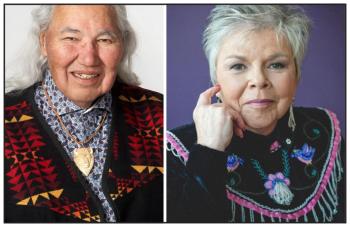Image Caption
Summary
Local Journalism Initiative Reporter
Windspeaker.com
It took the resignation of its entire Indigenous advisory council for CN Rail to acknowledge “the complex history of railways and the role they played as instruments of colonial policies, as well as the intergenerational economic, cultural, and social effects that these policies have had on Indigenous communities.”
CN issued its formal acknowledgement Monday, just after the 12 members of the council tendered their resignations en masse.
The acknowledgement also stated, “We are grateful for the privilege of working and residing on these lands and recognize and honour their original people…”
Council co-chairs Roberta Jamieson and Murray Sinclair said in a prepared statement to Windspeaker that “an acknowledgement is a start – but it is not an apology.
“We can see Indigenous people want a good relationship with CN. Good relationships cannot happen without listening, understanding and an apology followed by action,” the statement continued.
On Dec. 11, the Indigenous Advisory Council said its members had resigned because CN was refusing to “move beyond performative gestures, and commit itself to transformative change.”
Jamieson said in an interview with Windspeaker that same day, it had become clear that CN had “no intention of acknowledging and accepting their role in the historical and ongoing impact on Indigenous peoples.”
Jamieson, a lawyer, the first woman appointed as Ontario Ombudsman, and the former president and CEO of Indspire, said the council felt it owed it to Indigenous peoples across Canada to step down after the major corporation had made no effort to respond to the council’s first report delivered more than a year ago.
When consulting with Indigenous people for that report, Jamieson said the most important message they heard was that the “road to reconciliation has to begin with an acknowledgement on the part of CN to the history of rail in Canada and the relationship with Indigenous peoples.”
The 51-page report, which has not been made public by CN, includes other recommendations, but Jamieson would not comment on what they were.
Jamieson said she is disappointed with what has occurred.
She said she joined the council in late 2021 in part to work with Sinclair, former chair of the Truth and Reconciliation Commission (TRC) on the legacy of Indian residential schools, and to accept CN’s invitation to improve its relationship with Indigenous people on a path to reconciliation.
“I thought, ‘CN is an iconic Canadian company and what an opportunity for leadership to be shown.’ So I was very excited at the prospect of working on this assignment,” she said.
Jamieson understood that CN had a challenge in front of it considering the history of the railway is “a dark one.”
“What we heard is CN and all railway is very much aligned, in the minds of our people, with history, with dispossession of land, with residential schools. One of the main planks of the foundation to move forward has to be an acknowledgement of that history and a connection of today's entity with that history and an acceptance of responsibility,” said Jamieson.
But that wasn’t forthcoming. Nor was CN’s acknowledgement of the benefits it continues to experience because of the history.
“They continue to enjoy…the use of land and so on, just as our people continue to experience the impact of the loss,” said Jamieson. “It's something that continues today. It's not something in the midst of history, lost forever.”
Jamieson said the council’s resignation was not meant to send a message to corporations as a whole or to set an example for other Indigenous advisory councils that may be frustrated with the lack of movement from the organizations or corporations with which they are associated.
But she does have a message for corporations that are trying to follow call to action 92 in the TRC’s final report, which sets out that the “corporate sector… adopt the United Nations Declaration on the Rights of Indigenous Peoples as a reconciliation framework and to apply its principles, norms, and standards to corporate policy and core operational activities involving Indigenous peoples and their lands and resources.”
“Companies who are serious about reconciliation efforts really need to examine how best to get there,” said Jamieson.
There are options available, she said. Appointing Indigenous members to boards of directors. Ensuring senior executives include Indigenous people. Or creating advisory councils.
“I think companies need to understand that transformational change is required and transformational change needs to be led by Indigenous people,” said Jamieson. “The expectations need to be clear and the commitments need to be authentic.”
In a statement Dec. 11, CN said it accepted the resignation of the members of the Indigenous advisory council. Senior Vice-President Olivier Chouc thanked the members for their “significant and meaningful contribution as we envisage a path forward for our company.”
CN said it would further the work and recommendations from the advisory council with a team it has built of nine managers, including Indigenous and regional representation.
The team will develop and renew “respectful relationships” with Indigenous communities as well as develop CN’s Reconciliation Action Plan with CN leadership.
Its first action plan, read CN’s statement, would build a foundation on five key pillars: cultural awareness and employee engagement; people and employment; community engagement and relationships; economic reconciliation; and environmental stewardship and safety.
CN plans to release its action plan in 2024 with specific measurable initiatives. It also intends to report on a regular basis on its progress on its commitments.
In their statement, Jamieson and Sinclair acknowledged CN for making a commitment toward an action plan, but added, “unless the (plan) is based on a full acceptance of responsibility, the plan will fail.”

